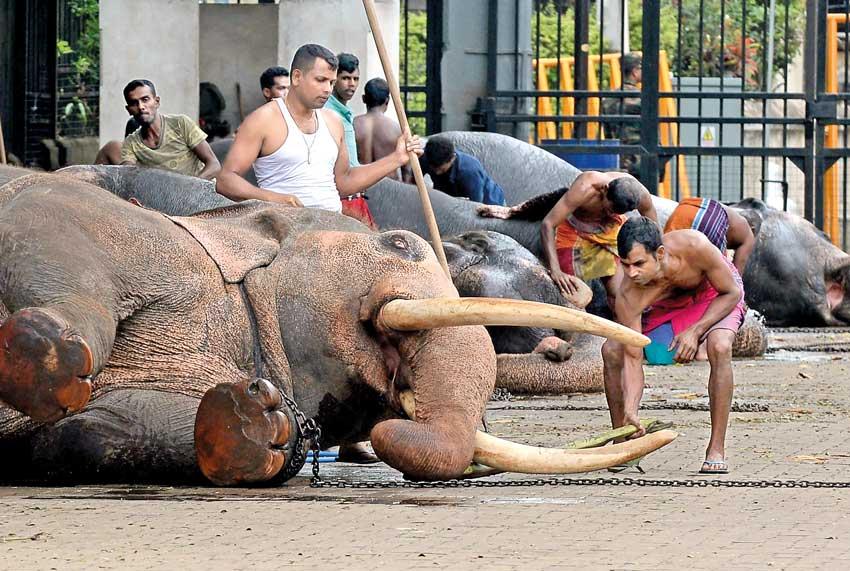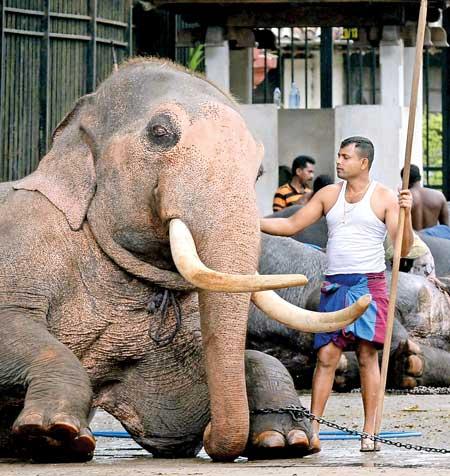19 Aug 2021 - {{hitsCtrl.values.hits}}

Elephants are captured, torn away from their herds and natural habitat and used like slaves (Pic AFP)
Sri Lanka currently uses outdated laws such as the Prevention of Cruelty to Animals Ordinance dating back to 1907 to roll out punishments in status quo
With reference to this article abused dogs and elephants in captivity fall under this proposed bill
The market for pedigree dogs is so high that animals are often stolen by those who want to earn money quickly and easily
Elephants are one of the most endangered species in Sri Lanka
Domestic animal abuse in Sri Lanka has been a pandemic all of its own
This Act, if passed, will be a huge stepping stone in protecting animals, as Sri Lanka currently uses outdated laws
 Historically in Sri Lanka animals have always coexisted with humanity and a companionship and understanding developed between each other. However, in the status quo the animal kingdom has suffered significant harm and loss of life, purely due to the negligence and ignorance of the society at large.
Historically in Sri Lanka animals have always coexisted with humanity and a companionship and understanding developed between each other. However, in the status quo the animal kingdom has suffered significant harm and loss of life, purely due to the negligence and ignorance of the society at large.
As a result of man, the legislature, which was built to protect the welfare of domestic and wildlife creatures, is yet to be passed or implemented. Such delays have caused significant destruction to property, welfare and lives and will continue to do so if swift action isn’t taken.
What is the Animal Welfare Bill?
It is an Act to provide for the protection of animals from cruelty; to foster kindness, compassion and responsible behaviour towards animals in the community; to establish a National Animal Welfare Authority; to provide for animal welfare generally; and for matters connected therewith or incidental thereto.
Simply put, the Act is a mechanism that will ensure animals are protected within the law and any individual who violates the Bill can be held accountable for his/her actions. This Act, if passed, will be a huge stepping stone in protecting animals, as Sri Lanka currently uses outdated laws such as the Prevention of Cruelty to Animals Ordinance dating back to 1907 to roll out punishments in status quo.
Which animals fall under the Animal Welfare Bill?
Domestic animals, a farm animal, an animal in captivity, a companion animal, a stray animal and a food animal fall under this bill. With reference to this article abused dogs and elephants in captivity fall under this proposed bill. The wild Elephants facing jeopardy fall under the Act called The Fauna and Flora Protection Ordinance.
Innocent animals suffer mistreatment every day, mainly due to human negligence. The abuse of strays, the illegal breeding of dogs, and the killing of Elephants are only a few examples. The purpose of this article is to open the public’s eyes to the suffering of these voiceless innocents and to make the government aware that passing the Animal Welfare Bill is mandatory and should be done without any further delay.
A threatened symbol of pride
The Elephant is a symbol of pride, and of cultural and religious significance to Sri Lanka. Yet we are abusing and killing these majestic creatures every day. There are about 5, 500 wild elephants left in Sri Lanka and since January 2021, 167 of them have been killed. However, in reality, these are only the estimated death counts as some elephants may have gone far into the depths of the jungle to die. Elephants are one of the most endangered species in Sri Lanka. Despite this the present government forges ahead with its prestigious projects, some of which are non-essential, ineffective and, in all honesty, insignificant in comparison to the significant issues that are largely ignored.
The main causes of the horrific deaths of these gentle giants are due to hakka pattas (food packed with explosives that detonate on being bitten into), snares, electrocution’, poisoning, falling into wells and gunshot wounds. All of these are human induced killings and can be easily stopped if a proper urbanization plan is followed to solve the Human- Elephant conflict; something that has been going, in Sri Lanka for many years, and is spoken about frequently.
Is this the culture we want today?
Elephants are of cultural and religious significance to this country. They are captured, torn away from their herds and natural habitat, and used like slaves. In peraheras, they are illuminated with lights and paraded in heavy clothing, for hours, without any form of relief. All the while their so-called masters poke them with painful bull hooks in sensitive parts of the body to keep them going. In addition to the trauma, the people watching the perahera taunt and throw objects at them to get their attention. As beautiful as they may look when donned with dazzling clothing, the physical torture and mental strain must be enormous.
On March 12, 2021 the Maha Sangha brought the President’s attention to the alleged shortage of tame elephants for Peraheras. At that discussion, the members of the Tamed Elephant Association noted that it takes about three years to train an elephant or a tusker to take part in a perahera. The “training process” itself is traumatic for the animal. For example, one method used is called “Crushing” but, in truth, rather than ‘taming’, just breaks their mind and spirit until they are exhausted and forced to become submissive. They are beaten, fettered in short chains and they, eventually, give up and cooperate with the mahouts.
Domestic animal abuse
Domestic animal abuse in Sri Lanka has been a pandemic all of its own, unaddressed and ignored by the government who is always too busy and too distracted with their own manufactured problems, keeping voters diverted too from the real world around them.
Sri Lanka has a way to go, and it will take time to correct the issues when dealing with stray animals and the abuse of animals. Many animal welfare organizations have been advocating, for over a decade, for an Animal Welfare Bill, the final draft of which has been ready for some time, but has yet to be implemented. Among the plethora of issues, overcrowding, limited sterilization campaigns and insufficient government legislature to protect animals are some of the most pressing problems that need to be addressed.
Nowhere to call home
The little that government agencies used to do seems now to be forgotten by them. In any case, they did the bare minimum, organizing sterilization campaigns for street dogs; a good deed now gone.
During this COVID-19 pandemic, the only source of shelter and protection stray animals have had is due to the generosity of shelters and animal lovers. This, however, isn’t enough to help the over three million dogs that are currently walking the streets with nowhere to call home. Shelters are at full capacity and are forced to turn animals away. Shelters not only lack space, but also they do not have the finances and resources to care for as many animals as they would like to. This is an issue for both large and small shelters, who are now facing a lack of funding or Government support.
Horrible breeding farms
Another distinct, rarely talked about, issue in Sri Lanka are the horrific breeding farms that exist due to the high demand for pedigree animals. Pedigree dogs are locked up in cages for most of their lives and then thrown away by the breeders once the animals are of no further use to them. The market for pedigree dogs is so high that animals are often stolen by those who want to earn money quickly and easily.
The cycle of mass-producing pedigree dogs is a living nightmare for the animals who are beaten and malnourished and only given the bare minimum in order for them to be able to produce more puppies for the business owners. Love and compassion are foreign to these animals, who turn violent and become fearful of humans as a result of the heartless lives they are forced to live. Although they are hard to deal with, shelters take such animals in but, unfortunately, it is sometimes too late to save them.
The worst feeling is seeing these animals and being unable to help them in any way. If people are unable to take care of dogs they must not adopt them, a message that many helpless welfare organizations have to continuously share for the simple fact that Laws do not exist to make things right.
No animal deserves to live in misery
In some instances dogs as well experience similar events as the wild elephants as they could be a nuisance to farmer’s chicken coops or crops therefore they are either wounded by gunshots or by hakka pattas.
In two separate incidents the wrong doers who set “Charlie” the Labrador on fire and cut off the limbs of an innocent dog called “Kane” were let off lightly as the punishment for such a crime is a fine of only a 100 Rupees and a 6 month imprisonment which is rarely imposed.
It is important to understand that aside from dogs and elephants, all other types of wildlife and domesticated animals who may suffer from abuse are not protected due to the continuous use of archaic laws which in hindsight allow the perpetrator to escape justice. In addition, if this law is passed it is important that the law be implemented.
Animals are a part of Sri Lankan nature and people’s lives. It is time that the promises governments make are actually kept so that both wild and domestic animals can live in peace. It is hard to believe that the Animal Welfare Bill will ever be passed, especially with the decades’ long delays seen for the implementation of similar legislation. It is understandable that with the current pandemic, processes have been delayed. However, given the urgency of the situation it is about time that the Bill be passed in parliament.
However, if the government fails to stick to their promises, society is not afraid to hold them accountable. It is time the government did less talking and took more action, and what better way to begin this new path than by saving these innocent beings who have become an inherent part of Sri Lanka’s history and culture.
No animal deserves to live a miserable life locked up in a cage or bound in chains. It is our duty as human beings to put an end to this suffering and have more compassion and empathy towards them. That is only possible if we change our ways and teach our children that animals have emotions and feel pain just like us, and to never intentionally hurt them.
As Mahatma Gandhi always said, “the greatness of a nation and its moral progress can be judged by the way its animals are treated”.
28 Nov 2024 6 hours ago
28 Nov 2024 7 hours ago
28 Nov 2024 8 hours ago
28 Nov 2024 9 hours ago
28 Nov 2024 28 Nov 2024